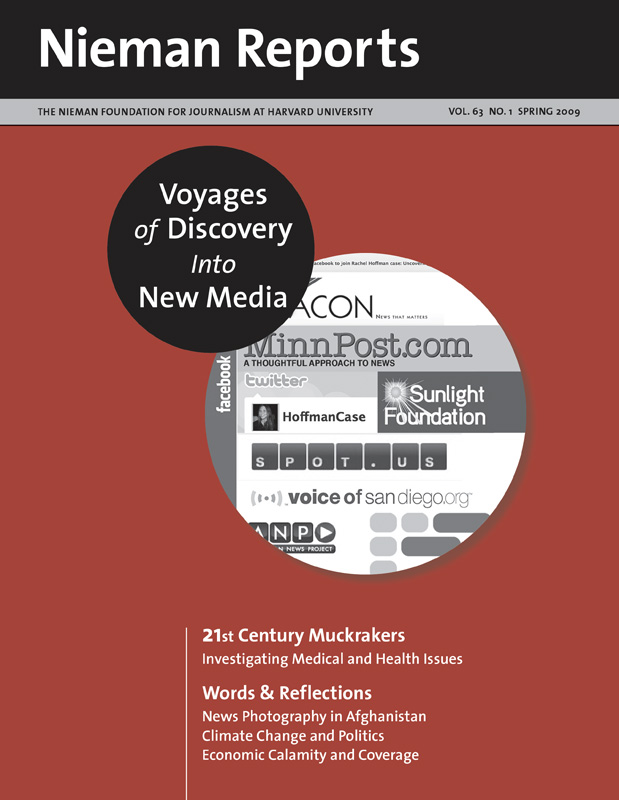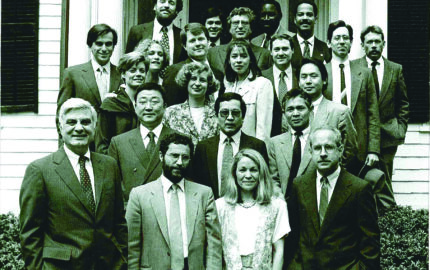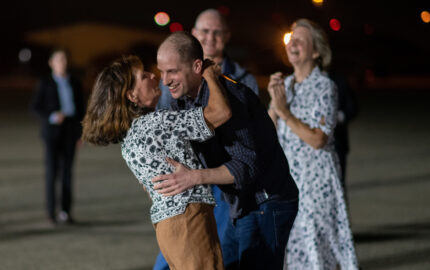Attached to the personal statement in the file of a Nieman Fellowship applicant for the class of 2010 is this note of explanation concerning his “evolving situation.” He had been offered a buyout from his company, he said, and had decided to accept it. He and his family would be moving back to the United States from a foreign posting in the spring, and he planned to become a freelance correspondent. He was applying with the institutional backing of his news organization but, if selected, he would come to Harvard as a freelance journalist.
Another candidate wrote that the leadership of her newspaper “has decided that they will no longer support applications for long-term fellowships. The understanding is that the paper is at a critical juncture and everyone needs to be on board, contributing to make the new newspaper a success.”
One reporter lamented that editors were being shortsighted in failing to recognize the Nieman experience was an “opportunity for the paper to help me grow as a journalist and return with a deeper understanding of a subject that I write about.”
We also learned that candidates applying without support from their editors would, if selected, be required to resign from their jobs. Their editors told them they would be welcome to reapply for their jobs following the Nieman year, but there would be no guarantee. I counseled these anxious journalists that if they applied, the Nieman Foundation would welcome their application without the required letters of recommendation. I also urged them to be straight up with their editors in telling them they were applying without the newspaper’s support. Other aspiring fellows seem resigned to setting aside their dreams of a fellowship for now, hoping that staying put will enable them to protect their jobs.
In this time of shrinking news staffs, when news executives are posting unusual obstacles in the paths of journalists who want to seek a fellowship year, a sharp increase in the number of applicants might be surprising. Yet the pool of U.S. applicants for the class of 2010 totals 164 (compared to 127 a year ago). Overseas, where staff reductions are not as prevalent, interest in the Nieman program also is on the rise. A new class of international fellows has been chosen from among 150 candidates; 111 applied for places in the class of 2009.
Over the years, journalists from daily newspapers traditionally have dominated the applicant pool and Nieman classes. But those numbers are changing. A year ago, 68 newspaper candidates made up half of the candidate pool. For the class of 2010, 45 fellowship aspirants are from newspapers, fewer than one-third of the applicants.
Sixty-four of the U.S. candidates identify themselves as “freelance journalists;” some have been working independently for several years, while others are newly separated from their newspapers or broadcast outlets and are setting out to shape new professional lives. Last year, 26 self-identified freelance journalists applied. The applicant pool also reflects increased interest from radio and television journalists—28 compared to 16 in 2009.
Six candidates work full time as online journalists, against one in 2009, but that number doesn’t tell the full story. Several applicants from mainstream news organizations told us their duties include reporting for or directing work for the news organization’s Web site. Others wrote enthusiastically about their blogs.
In our initial reading of applications, we also can recognize shifting expectations of what the new class might want the Nieman Foundation to provide toward their development as journalists. In essays laying out their aspirations for the year, many fewer mention an interest in strengthening their writing skills in our creative writing and narrative journalism classes. Rather, candidates are more likely to say they want to broaden their skills in using multimedia tools. This pattern has emerged during this Nieman year, in which participation in the writing programs has declined, and fellows have chosen to invest time in learning about digital journalism.
Anticipating that the new class will have a similar high interest, the foundation is working to create and provide a coherent curriculum; our plans include 19 Friday afternoon sessions with multimedia teachers during the academic year, supplemented by other opportunities to improve one’s skills with a range of online tools for telling stories in words, images and sound. The curriculum is organized by topic and will include a mix of hands-on and theoretical work beginning with a session about how the Web works.
As the complexion of Nieman classes evolves and becomes less print-centric, the foundation will address the challenge of satisfying expectations for a different kind of transformative experience, one that holds to the tradition of getting the most out of Harvard classrooms as well as investing in helping fellows develop the competencies necessary to strive for journalistic excellence in the digital age.
Another candidate wrote that the leadership of her newspaper “has decided that they will no longer support applications for long-term fellowships. The understanding is that the paper is at a critical juncture and everyone needs to be on board, contributing to make the new newspaper a success.”
One reporter lamented that editors were being shortsighted in failing to recognize the Nieman experience was an “opportunity for the paper to help me grow as a journalist and return with a deeper understanding of a subject that I write about.”
We also learned that candidates applying without support from their editors would, if selected, be required to resign from their jobs. Their editors told them they would be welcome to reapply for their jobs following the Nieman year, but there would be no guarantee. I counseled these anxious journalists that if they applied, the Nieman Foundation would welcome their application without the required letters of recommendation. I also urged them to be straight up with their editors in telling them they were applying without the newspaper’s support. Other aspiring fellows seem resigned to setting aside their dreams of a fellowship for now, hoping that staying put will enable them to protect their jobs.
In this time of shrinking news staffs, when news executives are posting unusual obstacles in the paths of journalists who want to seek a fellowship year, a sharp increase in the number of applicants might be surprising. Yet the pool of U.S. applicants for the class of 2010 totals 164 (compared to 127 a year ago). Overseas, where staff reductions are not as prevalent, interest in the Nieman program also is on the rise. A new class of international fellows has been chosen from among 150 candidates; 111 applied for places in the class of 2009.
Over the years, journalists from daily newspapers traditionally have dominated the applicant pool and Nieman classes. But those numbers are changing. A year ago, 68 newspaper candidates made up half of the candidate pool. For the class of 2010, 45 fellowship aspirants are from newspapers, fewer than one-third of the applicants.
Sixty-four of the U.S. candidates identify themselves as “freelance journalists;” some have been working independently for several years, while others are newly separated from their newspapers or broadcast outlets and are setting out to shape new professional lives. Last year, 26 self-identified freelance journalists applied. The applicant pool also reflects increased interest from radio and television journalists—28 compared to 16 in 2009.
Six candidates work full time as online journalists, against one in 2009, but that number doesn’t tell the full story. Several applicants from mainstream news organizations told us their duties include reporting for or directing work for the news organization’s Web site. Others wrote enthusiastically about their blogs.
In our initial reading of applications, we also can recognize shifting expectations of what the new class might want the Nieman Foundation to provide toward their development as journalists. In essays laying out their aspirations for the year, many fewer mention an interest in strengthening their writing skills in our creative writing and narrative journalism classes. Rather, candidates are more likely to say they want to broaden their skills in using multimedia tools. This pattern has emerged during this Nieman year, in which participation in the writing programs has declined, and fellows have chosen to invest time in learning about digital journalism.
Anticipating that the new class will have a similar high interest, the foundation is working to create and provide a coherent curriculum; our plans include 19 Friday afternoon sessions with multimedia teachers during the academic year, supplemented by other opportunities to improve one’s skills with a range of online tools for telling stories in words, images and sound. The curriculum is organized by topic and will include a mix of hands-on and theoretical work beginning with a session about how the Web works.
As the complexion of Nieman classes evolves and becomes less print-centric, the foundation will address the challenge of satisfying expectations for a different kind of transformative experience, one that holds to the tradition of getting the most out of Harvard classrooms as well as investing in helping fellows develop the competencies necessary to strive for journalistic excellence in the digital age.



